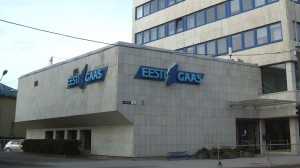
Echoing the criticisms of Lietuvos Dujos, Eesti Gaas said unbundling the company will not bring new suppliers, reduce the prices, nor reduce Gazprom's importance in the market.
TALLINN — The Estonian government’s plan to unbundle national energy company Eesti Gaas, purportedly to diversify the country’s gas market, is being strongly criticized by the company management.
In an interview with Estonian business newspaper Äripäev published on Friday, Raul Kotov, board member of Eesti Gaas insisted that European Union directives do not require the separation of sales and transmission ownership in Estonia, as the ruling coalition is using as a pretext for the legislation proposed on Wednesday. The same exception has been given to Latvia and Finland, Kotov said. Kotov stressed why Estonia chooses to follow Lithuania’s example, not Finland’s who “have been showing themselves as smart managers in energetics.”
“The separation does not bring new suppliers, reduce the prices, nor reduce Gazprom’s importance in the gas that’s used in Estonia,” Kotov said, adding that he agreed with the similar criticism Lietuvos Dujos is making about the Lithuanian government’s decision to unbundle that gas monopoly.
Kotov also argued that the ruling coalition’s allegation that Gazprom is barring newcomers from the market is totally wrong, as 63 percent of Eesti Gaas belongs to non-Russian enterprises, so Gazprom cannot decide on the destiny of the Estonian gas economy.
“All questions related to the access to the gas network is solved by AS EG Võrguteenus [an Eesti Gaas subsidiary], and companies wishing to establish liquefied natural gas terminal … have already turned to them,” said Kotov. “Gazprom does not have any opportunity to prevent the establishment of LNG terminals and merging them with the network.”
Another accusation by the government claiming that that the gas prices in Estonia are more expensive than in the rest of Europe is also incorrect, according to Kotov. In July the gas price in Estonia is 6.70 krooni (€0.43) per cubic meter, while in Hamburg, Germany the price is 11.20 krooni (€0.7) per cubic meter and in Finland 10.10 krooni (€0.65) per cubic meter.
Eesti Gaas also claimed that the state has not discussed the issue with them, and the government’s plan to create such bill is unexpected.
The ruling coalition met Wednesday and agreed to start developing a bill in September that would split the company’s transmission and sales divisions into separate companies. Eesti Gaas, which has a monopoly on natural gas transmission and sales in Estonia, is 37 percent owned by Russian gas giant Gazprom. E.ON Ruhrgas holds 33.6 percent of the shares while 17.7 percent is owned by Finnish FortumHeat and Gas OY and 9.8 percent by Itera Latvija.
“Every thoughtful and effective step to curb monopolies is justified as the consumers are unprotected in the monopoly market,” Ken-Marti Vaher, secretary of the Union Pro Patria and Res Publica told the media on Wednesday.
Vaher said that “Gazprom, the main owner of the gas network is doing nothing to enable access to other gas networks, also to other suppliers.”
This article is free to view. To read Baltic Reports’ subscription-only articles, click here.












